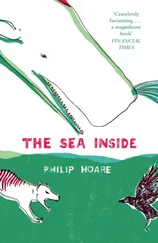I have visions of spending the night inside the museum, with the dinosaurs and stuffed tigers with their yellowing teeth and glass eyes. I think of the corner of the grounds where, until just before the war, it rendered its own specimens in pits of silver sand. Here carcasses were prepared for articulation and display, lowered into the sand where rain would percolate through, speeding up a process of decay that might take two years or more. Photographs show sperm whales being hauled out of a kind of animal dry dock, although they look to me like bodies being pulled from blitzed buildings. Only when local residents complained about the smell was the practice put to an end. It is hard to believe–as I eventually find my way into the bright lights of Knightsbridge–that behind the gothic façade dead whales once lay, tended by a boiler-suited scientist, who looked more like a gardener engaged in double-digging a trench–only with a cigarette purposefully in his mouth, presumably to counter the stench of the rotting animal at his feet.
Other whales are inhabitants of the superficial waters, connected to the sun and the waves. The sperm whale is a denizen of the deep, spending half its life feeding on blind-eyed creatures of the abyss. Yet as dark as it is, Physeter once provided the essential element of light. For two centuries or more, that same hooded head provided luminescence for drawing rooms and street lamps from Kensington to Kentucky. The very unit of light, the lumen, was measured from a pure white spermaceti candle, one candlepower being equivalent to the burning of one hundred and twenty grains of wax per hour. As it did not freeze, sperm oil could be used in lamps during the winter, as well as a lubricant for watches and other fine instruments. The whale was itself a manufactory, of strange substances and of human fortunes.
The sperm whale’s head contains two reservoirs of fluid which sit in the semicircular basin of its skull. The uppermost is the spermaceti organ, or case , a long, barrel–or cone-shaped structure surrounded by a muscular sheath and containing a spongy network of tissues saturated with oil. This lies on top of the second chamber, the junk , divided from it by the right nasal passage, also filled with oil. It is this precious semi-liquid that defines the whale–still more its historical value–and yet which its terse-lipped owner declines to explain.
In the absence of any such elaboration, science steps in. Or at least, it tries to. One theory is that the whale’s head is an enormous buoyancy aid. The oil’s density and viscosity changes with temperature; thus, as the whale draws in cold water along its right nasal passage, it cools the oil which becomes heavier in the process (unlike water, which gets lighter as it freezes). Warming the organ with its body heat, the effect is that of wax in a lava lamp, allowing the whale to rise and fall at will. But this elegant hypothesis is disputed, and others consider that the oil’s primary function is to act as a focus for the whale’s powerful sound system. In effect, its ability to carry sound turns the animal’s head into a highly directional loudspeaker, allowing it to broadcast its presence.
Ishmael assigns a more sensual role to this magical liquid. In one of Moby-Dick’s most extraordinary chapters, ‘A Squeeze of the Hand’, he and his shipmates sit round a tub of spermaceti, squeezing lumps out of the cooling oil.
Squeeze! squeeze! squeeze! all the morning long; I squeezed that sperm till I myself almost melted into it…and I found myself unwittingly squeezing my co-laborers’ hands in it, mistaking their hands for the gentle globules. Such an abounding, affectionate, friendly, loving feeling did this avocation beget; that at last I was continually squeezing their hands, and looking up into their eyes sentimentally; as much as to say…Come; let us squeeze hands all round; nay, let us all squeeze ourselves into each other; let us squeeze ourselves universally into the very milk and sperm of kindness. Would that I could keep squeezing that sperm for ever!
Tellingly, this is followed by the even odder account of ‘The Cassock’, in which Ishmael describes a ‘very strange, enigmatical object…that unaccountable cone…nigh a foot in diameter at the base, and jet-black as Yojo, the ebony idol of Queequeg’. Only the assiduous reader would realize that he is talking about the whale’s penis. In a bizarre ritual, the ‘mincer’ removes the giant foreskin, ‘as an African hunter would the pelt of a boa’, and turning it inside out, stretches it and hangs it up to dry. He then cuts two armholes in the ‘dark pelt’ and puts it on. ‘The mincer now stands before you invested in the full canonicals of his calling,’ says Ishmael, ‘arrayed in decent black…what a candidate for an archbishoprick, what a lad for a Pope were this mincer!’ (Harold Beaver, a later editor of Moby-Dick , goes so far as to say that ‘this peculiar “mincer”…proves to be a mincing queer’ and ‘this “cassock,” turned inside out, spells “ass/cock” in the rigging’.)
Whether or not such a rite ever happened on board a whale-ship–and it may well be a figment of the author’s mischievous imagination–it is ‘the most amazing chapter in an amazing book’, wrote Howard P. Vincent, although he could not bear, in 1949, to discuss it further, beyond noting that ‘ninety per cent of Melville’s readers miss entirely the meaning of “The Cassock”’. Other writers were less coy about the sexual symbolism of the whale. D.H. Lawrence had already dubbed the sperm whale ‘the last phallic being’, and in 1938 W.H. Auden wrote of Ahab and ‘the rare ambiguous monster that had maimed his sex’–a reference to an incident in which the captain was found one night sprawled and insensible on the ground, ‘his ivory limb having been so violently displaced, that it had stake-wise smitten, and all but pierced his groin’. It was as if, in this entirely masculine world, men must sexualize the whale to make it submit–just as they might be subsumed by it in turn. By the 1970s Harold Beaver was declaring the same animal ‘both bridal chamber and battering ram…a true amphibium, dual-sexed as Gabriel’s “Shaker God incarnated”’. The protean whale had become a phallus itself, but also a spermatozoid, gigantic and seminal at the same time.
Given such mysterious and symbolic attributes, such legendary enemies and such iconic status, it is little wonder that the sperm whale was a fated beast, condemned to be the quarry of man. The blue whale and the finback were too fast, the humpback unproductive. It was the sperm whale–immediately recognizable by its angled spout, by its predilection for lying at the surface and, most paradoxical of all, by its essentially shy nature–that offered itself up as a sacrifice for all other whales: a silent, honourable champion.
Who aint a slave? Tell me that.
Loomings, Moby-Dick
Housed in its own vaulted, purpose-built hall is New Bedford’s grandest exhibit: a half-scale replica of a whale-ship. Even allowing for its reduced size, the confined lower decks of this vessel are intimidating. They resemble nothing so much as the slave ships of the age: the one designed to carry the harvest of dead whales; the other to convey living souls. In a nearby cabinet is a much smaller specimen: a framed daguerreotype of a handsome man with a sweep of sleek wavy hair, fine cheekbones and serious, querying eyes; he wears a dandy’s high-collared shirt and tie and an elegant dark coat. But this composed figure was the fomenter behind the campaign to abolish slavery–in a city that shackled men to the pursuit of the whale.
Читать дальше












